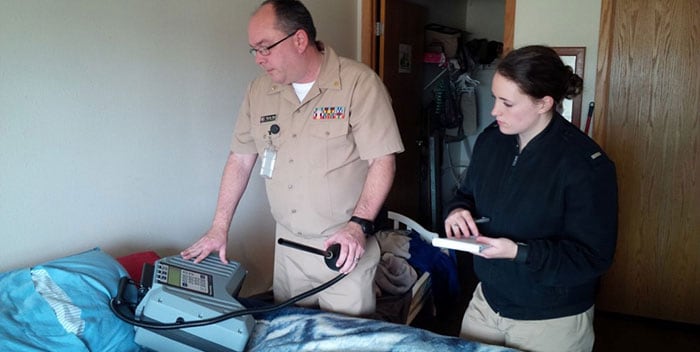Shining a light on environmental health and safety
CMU offers Michigan’s only accredited program in a field where opportunities abound
Central Michigan University has the state's only accredited program in a career field where job opportunities are growing and graduates report starting salaries as high as $70,000.
But it is overlooked by many students, even as some unknowingly take prerequisites for the program while pursuing other career paths.
The under-the-radar field is environmental health and safety, or EHS, a profession where a report finds that 26% of workers in health departments and related jobs across the U.S. plan to retire in five years while just 6% of public health students are pursuing EHS concentrations.
Take the first step
Environmental health and safety is an interdisciplinary bachelor's degree program between The Herbert H. and Grace A. Dow College of Health Professions and the College of Science and Engineering. Graduates' broad range of knowledge makes them candidates for a wide variety of jobs. Interested? Check out the program page.
Spreading the word
Science and engineering faculty member Rebecca Uzarski is director of the interdisciplinary major, and she is determined to spread the word.
"There are so many opportunities, so many options for advancement, so many areas to work in, but people don't know what jobs fall under the EHS umbrella," she said.
Broadly, environmental health officers protect the public from environmental threats and help communities recover from natural disasters.
Some job examples:
- Food safety.
- Water quality.
- Disease prevention.
- Occupational safety.
- Emergency preparedness.
And sanitarian.

That's the title for December 2019 EHS graduate Grant Ruppert, who works at the Allegan County Health Department. Sanitarians are also known as health and safety specialists. Their job is to ensure the public's health safety through inspections of hospitals, restaurants, industrial facilities, hotels, and more.
"I wanted to start at the sanitarian level because you get to do it all," Ruppert said.
His goal is to earn a master's degree in an environmental health field, such as toxicology of public health.
Small program, large opportunities
"The small number of students in the program was a huge advantage in getting a lot of one-on-one time with my advisor, networking with the other students, meeting professionals at educational conferences and competing for scholarships" Ruppert said.
Ruppert received three competitive scholarships in 2019: the National Environmental Health Association's undergraduate scholarship, the Michigan Environmental Health Association Endowment Scholarship and the National Environmental Public Health Internship.
The NEHA also paid for him to move to Ohio, where he had an internship with the Van Wert County Health Department.

Alum and U.S. Public Health Service Lt. Shelby Foerg found her passion after her 2014 graduation during an internship with the Junior Commissioned Officer Student Training and Extern Program. She spent the summer working on environmental health issues among American Indian tribes in Michigan and Wisconsin.
"Early into this experience, I knew that I wanted to pursue a career as a U.S. Public Health Service officer," she said. "You could say that I got my cake and ate it, too, with my interests in health and science lining up together in a field where it is difficult to be unsuccessful."
She was promoted to lieutenant in January 2019.
'A way of life'
"The person who graduates from this program not only is almost guaranteed a good-paying job, but one that is also doing good for the world," said Tom Masterson, dean of the College of Health Professions.
"It's more than a program, it's a way of life."